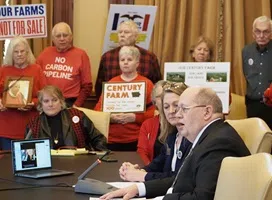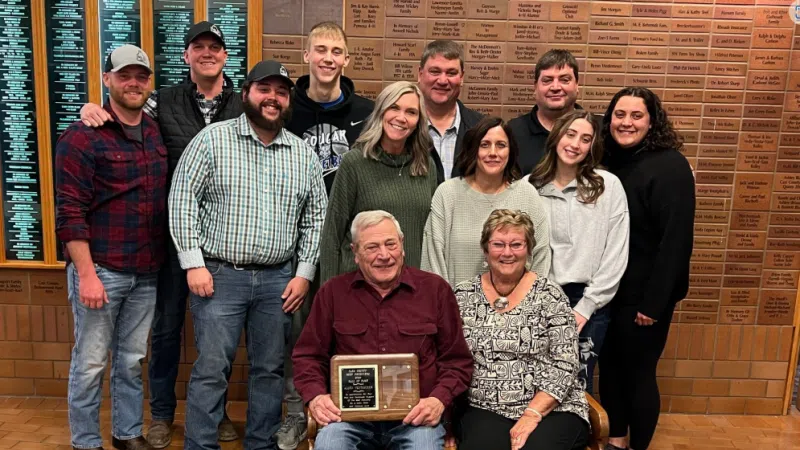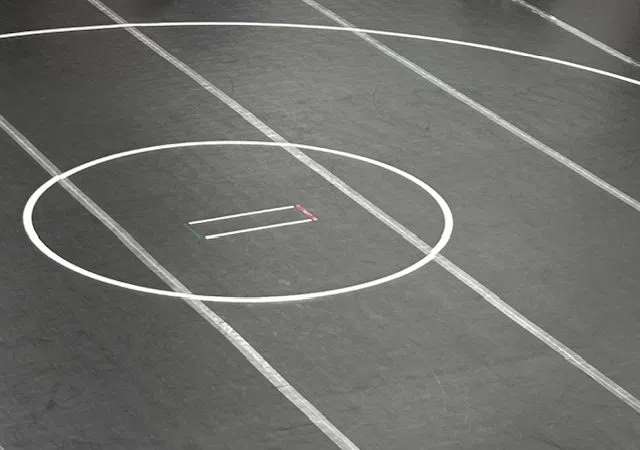(Des Moines) A coalition of House lawmakers introduced a package of six bills Thursday aimed at halting the construction of a carbon capture pipeline in Iowa.
Flanked by anti-pipeline activists, Reps. Charley Thomson, Helena Hayes, Mark Cisneros and Cindy Golding spoke about the legislative proposals at a news conference Thursday morning. The proposals, a total of six bills, seek to put new regulations on the Iowa Utilities Commission’s roles and oversight of pipeline projects, as well as on the exercise of eminent domain.
The measures come as lawmakers seek to limit the Summit Carbon Solutions’ proposed pipeline that would transport carbon dioxide from capture facilities, largely ethanol plants, to underground storage in North Dakota.
The IUC approved Summit’s permit in August 2024, a decision that granted the company use of eminent domain. However, Summit is not allowed to begin construction until the project is approved in other states including South Dakota, where the pipeline proposal has received significant pushback from lawmakers and property owners, as well as faced hurdles gaining state approval.
The legislation introduced include House File 238, a measure prohibiting the IUC from renewing permits for pipelines transporting liquid carbon dioxide; House File 242, allowing for landowners impacted by eminent domain takings to seek a declaratory review in court, and House File 240, requiring companies seeking hazardous liquid pipeline permits to show evidence they have insurance or surety to cover damages that could result from the construction or operation of a pipeline, as well as purchasing insurance or reimbursing people who have increased insurance premiums or who are not able to obtain insurance because of the project.
The suite of measures comes from the Republican Legislative Intervenors for Justice, a group of House GOP lawmakers that has taken other actions to stop the pipeline construction, like filing lawsuits claiming the IUC acted unconstitutionally and illegally when approving the Summit permit.
Thomson, R-Charles City, said the Pipeline and Hazardous Materials Safety Administration (PHMSA) is poised to take federal action heightening safety requirements for carbon dioxide pipelines, and some of these bills were an effort to address concerns with the Iowa commission’s permitting and evaluation process.
“We see that the IUC made a number of errors on safety,” Thomson said. “We know that they made errors on constitutionality issues. This is to address … some of the problems that we saw in the IUC’s process that may have led to those errors.”
Thomson also introduced legislation, approved in a subcommittee meeting Wednesday, that would prohibit the IUB from considering climate change when issuing a pipeline permit.
Speakers at the news conference advocating against the pipeline construction said carbon capture pipelines pose health and safety risks to people who live near the project. Dan Tronchetti, a Greene County resident, said though landowners were told that CO2 pipelines are safe, he said he has since learned his home is in the “kill zone” for the pipeline if problems were to occur.
“With an eight-inch pipeline operating at 2,100 PSI, the kill zone would be 1,800 feet, and you would be dead in less than four minutes,” Tronchetti said. “Your internal combustion engine in your car or pickup will not run because the CO2 takes the oxygen out of the air. And so with my front door, 1,150 feet from the pipeline, that’s a major concern. I might go to sleep one night in my bed, and that would be the end of me.”
Advocates in support of the project have said there are risks associated with CO2 pipelines, but that the transportation method is overwhelmingly safe.
“Direct injection of CO2 through pipelines is one of the safest and most efficient methods of transporting and sequestering carbon,” American Carbon Alliance CEO Tom Buis said in a statement on the proposed PHMSA rules. “Pipelines have a proven track record of safety and reliability, minimizing the risks associated with other forms of CO2 transportation.”
These bills are not the first effort by House Republicans to pass legislation limiting pipeline construction. The House passed an measure allowing landowners subject to eminent domain requests by carbon dioxide pipeline companies to file earlier requests in court challenging the requests, and in 2023 approved a bill restricting pipeline companies’ ability to use eminent domain. However, these bills have consistently failed to gain traction in the Iowa Senate.
Thomson said he was “disappointed that the Senate has not given, in my view, adequate consideration to this issue.” However, he said he felt confident the legislation proposed for the 2025 session would move forward. Though “well-monied interests” in the state want the Summit project to move forward, he said Iowans and property owners are calling for action on the issue.
“The Senate, the other branches of the government can do what they do, but the people of Iowa demand an answer on this,” he said. “This is not going to go away. We’re not going to go anywhere. We’re going to get this thing done. We’re going to protect the constitutional rights of Iowans.”
Iowa Renewable Fuels Association Executive Director Monte Shaw said in a statement Thursday that not all Iowans support stopping the Summit pipeline, saying the proposed legislation would “destroy Iowa farmers’ ability to compete in growing, low carbon biofuels markets in the U.S. and around the world.”
“This muddle of bills is a slap in the face to the supermajority of Iowa landowners who support carbon capture pipelines,” Shaw said in a statement. “At a time when farm income has declined by $90 billion, we should be helping Iowa farmers access new and growing markets, not choking off their ability to participate. These actions represent wrong policy at the wrong time.”
Senate Minority Leader Janice Weiner said Democrats are largely in support of these legislative proposals and called for Republicans to allow the measures to be brought forward for the chamber’s consideration.
“We’ll see this year with some new senators, if any — particularly among our Republican colleagues — if anything changes with that,” Weiner said. “I personally support property rights, but I can’t tell you what my colleagues would do. But … I think that really, Iowans deserve, at least, to be able to see a vote take place.”
House Speaker Pat Grassley said some of the bills may be rolled together into larger bills as the session moves forward, but expects they will advance in some form through the House. Whether the Senate chooses to take action on pipelines this year is less certain, he said. He said there are issues within the House proposals he is hopeful “would at least get some level of consideration” in the Senate, but also said he would like to see the Senate take up its own proposals on how to tackle these issues.
“What I’ve been saying on eminent domain is, I’d love to see a situation where there is bills in the House, kind of like what we just talked about, and also some potential bills having activity in the Senate,” Grassley said. “Even if they don’t agree with one another, just knowing that there’s bills moving through the process, I think would be an optimistic sign to be able to get some things done.”
(Reps. Charley Thomson, right, R-Charles City and Helena Hayes, R-New Sharon, spoke about legislation to regulate or limit the use of eminent domain in carbon capture pipeline projects at a Feb. 6, 2025 news conference.) (Photo by Robin Opsahl/Iowa Capital Dispatch)













